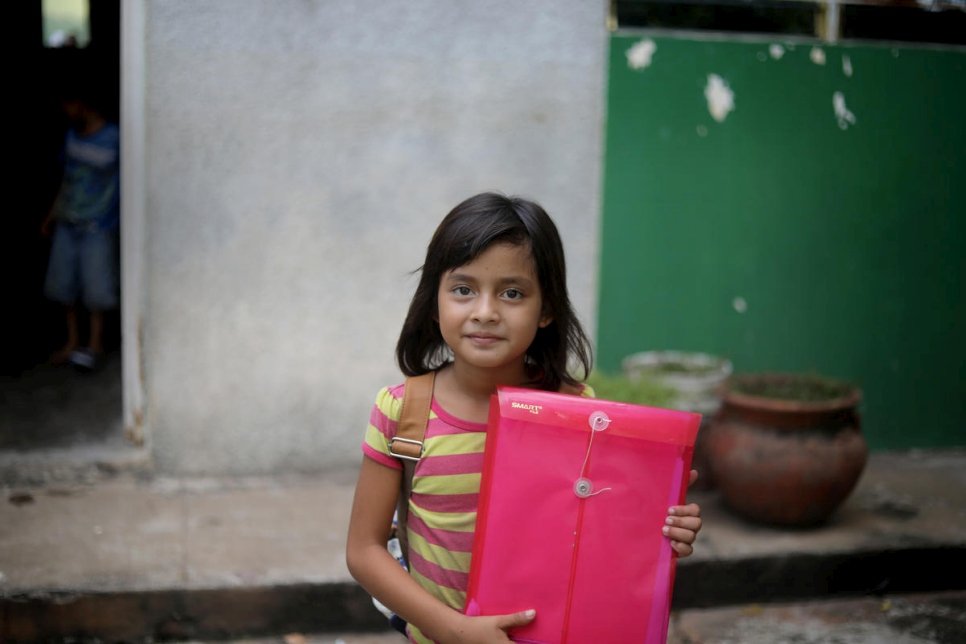Central America and Mexico reaffirm commitment to address the needs of hundreds of thousands forced to flee

A young girl from Honduras holds her family's asylum documents at a UNHCR-supported shelter in Tapachula, southern Mexico, November 2018. © UNHCR/Daniel Dreifuss
MIRPS countries commit to continue advancing effective responses to forced displacement in Central America during their third annual meeting.
8 December 2020 – The seven countries that form part of the Comprehensive Regional Protection and Solutions Framework (MIRPS) for Central America and Mexico, a mechanism for solidarity and responsibility sharing, presented progress made to address the forced displacement crisis in their region and defined priorities for the year ahead during the group’s third annual meeting.
Facing a growing number of people forced to flee in Central America and Mexico, MIRPS countries – Belize, Costa Rica, El Salvador, Guatemala, Honduras, Mexico and Panama – took stock of the current context and identified much needed policies at the national and regional levels to offer comprehensive solutions on protection, education, health, jobs and livelihoods to those forcibly displaced in the region.
Alexandra Hill, Minister of Foreign Affairs of El Salvador, which holds the MIRPS Pro-tempore Presidency in 2020, reiterated the commitment made by El Salvador to include refugees and people forced to flee within response and assistance plans.
“All our efforts seek to benefit a highly vulnerable population that requires priority attention,” said Hill, in a pre-recorded message, extending her gratitude to member States for their support during El Salvador’s Presidency of the MIRPS.
Violence and persecution have forced nearly one million people in Central America to flee within or across the borders of their countries. These include some 833,000 people from northern Central America and an additional 108,000 from Nicaragua.
The root causes that have prompted this forced displacement crisis, coupled with the intrinsic challenges of local integration, have been severely exacerbated by the emergencies of COVID-19 and recent tropical storms that caused widespread damage.
“It is at times like these, of multiple crises and challenges in the protection and assistance to displaced people, that the MIRPS becomes a beacon of responsibility-sharing and a testimony of the fundamental role of regional cooperation,” said Filippo Grandi, UN High Commissioner for Refugees during the high-level meeting.
In this context, the MIRPS is well-placed as a political and operational instrument to respond to critical humanitarian and development needs of hundreds of thousands of people, including those forced to flee and their host communities.
“It is our duty to continue strengthening the humanitarian and protection tradition that is rooted in our continent,” said Luis Almagro, Secretary General of the Organization of American States (OAS). He also reiterated the OAS’ commitment with the MIRPS. “We will continue supporting the efforts of MIRPS countries to seek further inclusion, protection and dignity. Above all, more rights for more people.”
The sustained support of the international community is crucial to address the complex needs of the region. Following its launch in the first Global Refugee Forum in December 2019, the MIRPS Support Platform has spearheaded the principle of responsibility-sharing to help address forced displacement in Central America.
The third annual meeting was convened by the government of El Salvador as outgoing Pro-tempore President of the MIRPS, with the support from the Technical Secretariat UNHCR-OAS. Concluding the meeting, the Presidency was officially handed over to Guatemala, who will lead MIRPS states in 2021.
“As incoming Pro-tempore Presidency, we intend to include and address mutual issues, ready to begin implementing our priorities for 2021 in collaboration with fellow MIRPS countries, with the support from the Technical Secretariat and the Support Platform,” said Pedro Brolo Villa, Guatemala’s Minister of Foreign Affairs.
To face the challenges in the year ahead, MIRPS states have adopted the San Salvador Declaration as a testament to their commitment to continue working together in the response to forced displacement in Central America and Mexico. Among their renewed commitments is to advocate for the inclusion of displaced people and returnees with protection needs within the plans to recover from the economic devastation of COVID-19 and natural disasters.
For more information
Consult the MIRPS website and the data portal on forced displacement in Central America and Mexico.
Consult the MIRPS annual report 2020.
- In El Salvador, Samali Dinarte, [email protected] +503 7070 1153
- In El Salvador, Oscar Ramirez, [email protected] +503 2209 3585
- In Panama, William Spindler, [email protected], +507 6382-7815
- In Panama, Diana Díaz Rodríguez, [email protected] +50766463469
- In Mexico, Sibylla Brodzinsky, [email protected], +52 1 55 8048 5054
- In Washington, Maria Isabel Rivero, [email protected], +1 202 340 3217
- In Geneva, Shabia Mantoo, [email protected] +41 79 337 7650
